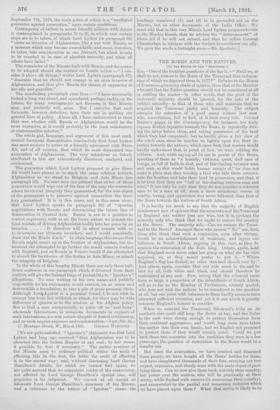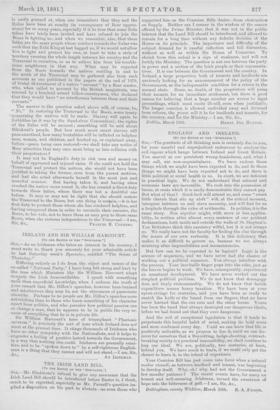THE BOERS AND THE NATIVES.
[TO TRH EDITOR OF TOR SPECTATOR.")
Sin,— One of the troubled questions of the day is,—" Shall we, or shall we not, restore to the Boers of the Transvaal that iudepen- en ce of which we deprived them iu 1877P" Debates in the House of Commons give every shade of opinion, from that of the Member who said that the Native question should not be considered at all in settling the matter—in other words, that the good of the (coloured). majority should be ignored, for the sake of the (white) minority—to that of those who still maintain that we acquired the Transvaal justly and honestly. The subject occupies the attention of a good many writers just now who, nevertheless, fail to look at it from every side. Colonel Butler's paper, in the Contemporary, for instance, too truly exposes British injustice towards the Boers, in repeatedly driv- ing the latter before them, and taking possession of the land which they had conquered; but he hardly gives a fair view of the whole case, since he touches so lightly upon the Boer in- justice towards the natives, which came first, that readers would hardly understand that, in point of fact, we were robbing the robbers. And, while saying all he can in praise of the Boers, speaking of them as "a homely, virtuous, quiet, dull race of beings, as full of faith in God, and of fair-dealing between man and man, as this world holds human sample of," he does not make it plain that they worship a God who bids them extermi- nate the heathen and take their land in possession, and that, if it be true that they are "full of fair-dealing between man and man," it can only be said that they do not consider a coloured man to be a man at all, since a more monstrous course of cruelty, wrong, and oppression was never followed, than that of the Boers towards the natives of South Africa.
It is hardly too much to say that the majority of English thinkers arc now of opinion that the annexation of the Transvaal by England was neither just nor wise, but it is, perhaps the minority only who think that we ought to restore the country to the Boors. The majority ask,—Cau we restore the Trans- vaal to the Boors P Amongst those who answer " No " are, first, those who think that such a concession, even after victory, would be an acknowledgment of weakness, and injure our influence in South Africa, arguing in this case, as they do against the restoration of the Zulu king. Others, again, hold that England must never relax her grasp on what she has once acquired, or, as they would prefer to put it,—" Where England's flag has floated, no other standard should ever fly." And others, again, consider that our rule must iu the end be best for all, both white and black, and should therefore be maintained at any cost. Few, seeing that the coloured races form so large a proportion of the inhabitants of South Africa, will go so far as the Member of Parliament, already quoted, who does not wish the natives to be considered in the question at all, but one point with reference to them hardly seems to have attracted sufficient attention, and yet it is one which it greatly concerns England's honour to consider.
When we annexed the Transvaal, Sikukuni's tribe ou its northern side could still keep the Boers at bay, and the Zulus to the east were strong enough to protect themselves from their continual aggressions, and would long since have taken the matter into their own hands, had we English not promised. to protect them if they would remain quiet. Could we put back these two countries into the condition they were iu a few years ago, the question of restoration to the Boers would be a simpler one.
But since the annexation, we have crushed and disarmed these people, we have fought all the Boors' battles for them, and have slaughtered thousands of their foes, carrying out two unjust, expensive, and bloody wars with the main object of paci- fying them. Can we now give them back, not only their country,
but power over the natives, who will be practically at their mercy, while flushed with success (in recovering their country), and exasperated by the partial and temporary restraint which we have placed upon them P What that mercy is likely to be is easily guessed at, when one remembers that they and the 'Zulus have been at enmity (in consequence of Boer aggres- sions) for so many years, especially if it be true that some Zulu tribes have lately boon invited and have refused to join the Boers in fighting us ; and when we remember, also, that these latter are the same people whose conduct towards the Zulus was such that the Zulu King at last begged us, if we would not allow 'him to fight and protect his own, at least to take a strip of 'territory running the 'whole length between his country and the 'Transvaal to ourselves, so as to relieve him from his trouble- some neighbours in that way. What may be expected from the Boers towards the natives residing in and to 'the north of the Transvaal may be gathered also from such accounts as one published in the papers at the end of 1879, ,of brutal ill-treatment of a native " servant " by a Boor master, who, when called to account by the British magistrate, was -rescued by a hundred armed fellow-countrymen, who declared that they would have " no interference between them and their
servants."
The answer to the question asked above will, of course, be, 4' No." In restoring the Transvaal to the Boers, some treaty ',concerning the natives will be made. Slavery will again be forbidden (as it was by the Saud-river Convention); the rights of the Zulus will be secured ; something will be said about Sikukuni's people. But how much more secret slavery will pass unnoticed, how many brutalities will be inflicted on helpless men, women, and children, and hushed up, or explained away, before—peace being once restored—we shall take any notice of Boer atrocities that may once more bring us into collision with -their perpetrators P It may not be England's duty to risk men and money on 'behalf of oppressed and injured races. If she could not hold the 'Transvaal and protect the, natives, she would not have been justified in taking the former, even from the purest motives, 'and had she acted afterwards herself in the most just and merciful manner. But having taken it, and having since crushed the native races round it, she has created a direct duty towards these latter, where there was but a doubtful one -before. It may or may not be right that she should restore the Transvaal to the Boers, but one thing is certain,—it is her first duty to protect those whom she has rendered helpless, and "-having conquered them in order to reconcile their enemies, the Boers, to her rule, not to leave them an easy prey to those same -Boers, when she restores independence to the Transvaal.—I am,



































 Previous page
Previous page